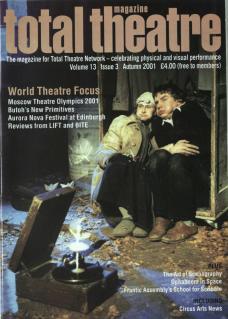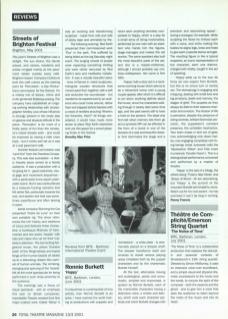If uniqueness is a prerequisite of true artistry, then Ronnie Burkett is an artist. I have roamed the world looking at productions with puppets and never seen anything remotely comparable to Happy, which is a play for a small army of string marionettes, performed by one man with an assistant who hands him the figures, stage-manages and makes the set revolve. The same assistant also built the most beautiful parts of the set and she is a master-craftsman, although I should probably say mistress-craftsperson. Her name is Terri Gilles.
Happy tells a story set in a handsome rooming house which seems to be a retirement home until a young couple appear, after which it is difficult to pin down anything definite about the house, since live characters walking through it clearly died some time ago, and the past seems still to have a hold on the present. The dead only find rest when memory lets them go and a symbolic RIP can be effected in the form of a burial in one of the drawers of a vast and beautiful dresser that dominates the stage and a ‘tombstone' – a white plate – is ceremonially placed on a dresser shelf. The dresser transforms itself and revolves to reveal various playing areas inhabited both by the puppet characters and by the charismatic Burkett himself.
All the text, alternately moving and scatological, poetic and iconoclastic, scripted and improvised, is spoken by Ronnie Burkett, each of the marionette characters having a distinctive voice, a timbre and delivery, which suits each character perfectly and which Burkett changes with precision and astonishing speed – during a duologue, for example. While sculpting the faces he imbues each with a voice, and while making the bodies he aligns legs, torso and head to give each a special stance and gait. The resulting figure is like a typical snapshot, an iconic representation of the character, each one distinct, charged with vitality, caught in the act of speaking
Happy adds up to the tour de force we now expect from Burkett, but this is no circus turn or variety act. The dramaturgy is engaging and intriguing, dealing with small lives and big emotions, death and memory, the stages of grief. The puppets as they always do distil to their essence character and emotion. The illusion of life is pervasive, despite the presence of string controls, brilliant technical precision, the puppeteer's constant presence, the unhidden mechanics. Your brain snaps in and out of gear, now acknowledging only dead matter, now engaging completely with living beings (what Jurkowski calls the ‘Opalisation Effect' and Tillis more mundanely ‘Double Vision’). This is a distinguished performance conceived and performed by a master of theatre.
Happy is the last of a trilogy, the others being Tinka's New Dress and Street of Blood. All are astonishing, but Happy is the summit of the mountain Burkett set himself to climb. Watch out for his next ascent – he has promised it won't be long in coming.

